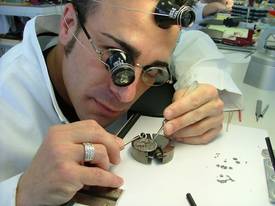Sent to you via Google Reader
Anthrax's Dan Spitz is now a master watchmaker
Hodinkee's John Reardon has a great profile on and interview with Dan Spitz, former Anthrax guitar hero who quit the music business to become a world-renowned, prize-winning watchmaker who hand-lathes his own replacement parts for antique watch restorations. Reardon quit his gig to spend more time with his family -- he has twin boys who have autism -- and to pursue his lifelong technical passions. He's hand-built his own workbench!
Funny story, actually. I was working as a watchmaker in Geneva and thinking I would never go back to music when Dave Mustaine from Megadeth called me and said "Dude, what are you doing? Stop messing with watches. You need to come back and start writing music again. You are one of the creators of our genre, thrash metal. You need to stop tinkering around with these million dollar toys and get back to music." This lecture led to the end of my solitary confinement as a watchmaker. I looked down the bench and saw another watchmaker working on a crazy watch but obviously also headbanging. I walked over to him and saw that he was blasting Slayer. He was working on a multiple fly-back, jump hour, chrono, perpetual calendar, moon phase, tourbillon and he's blasting Slayer! I looked at him and thought, "That's it, I'm done. I'm going back to music." In the end, most people in Switzerland are blasting while working on watches, anything from Barbra Streisand to Slayer.
My grandfather was a watchmaker, and I grew up playing with junk movements and parts. It's amazing to hear the story of someone so accomplished -- especially in a second career begun as an adult.
Interview: Meet Dan Spitz, Anthrax Guitarist Turned Master Watchmaker
(via Kottke)



